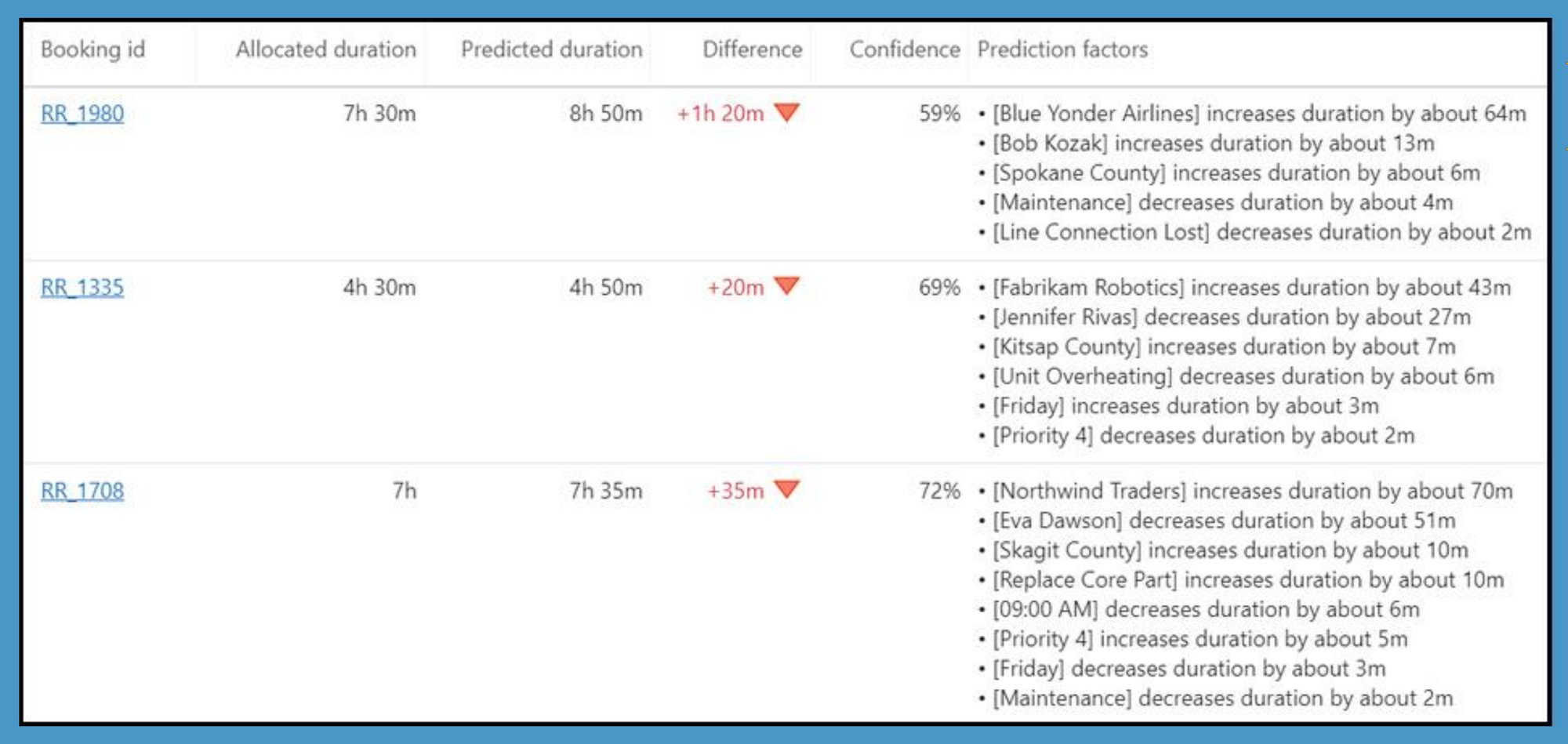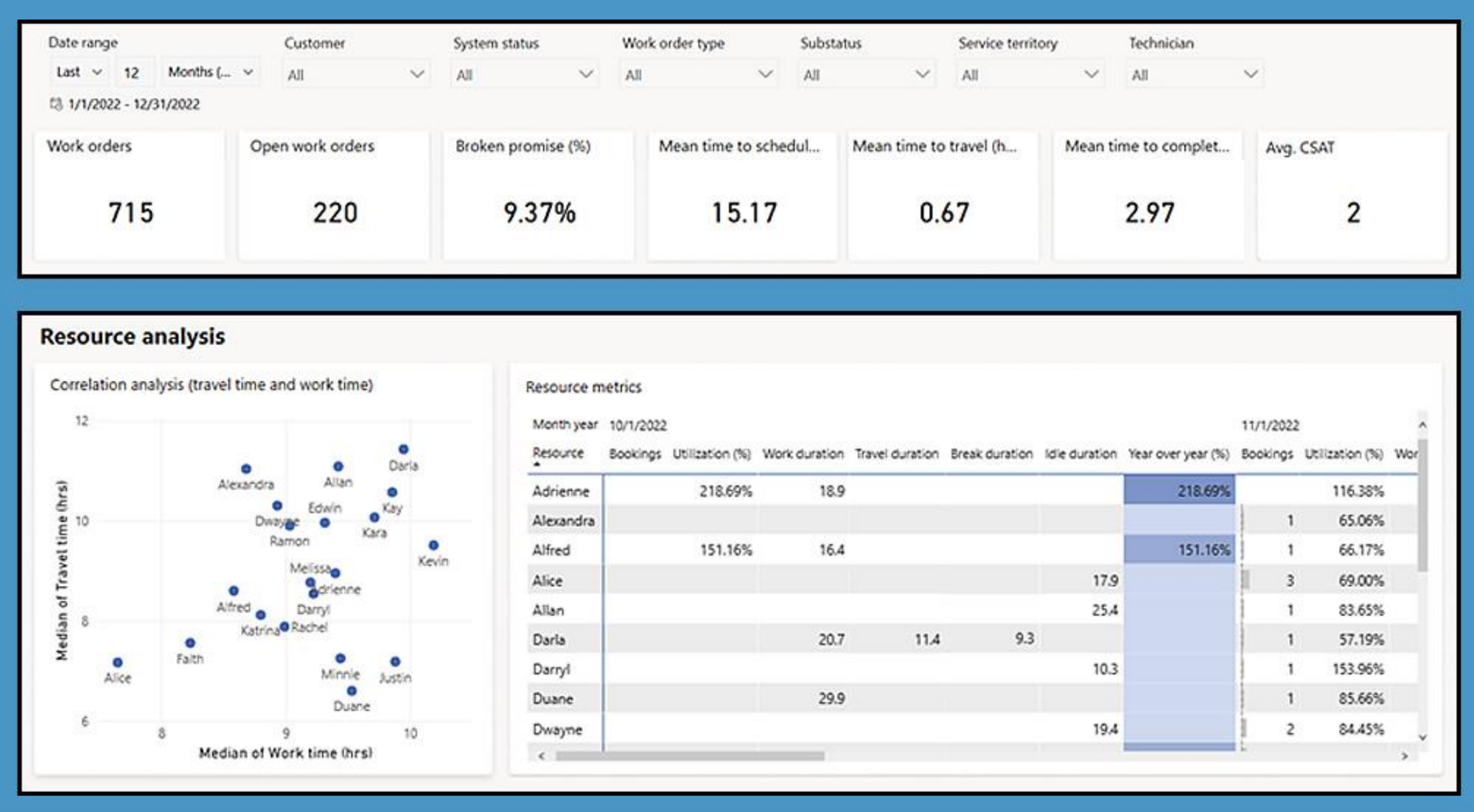Microsoft’s Dynamics 365 Field Service technology uses AI to single out workers and closely monitor their performance, a new report says. The report, released by Austrian research institute Cracked Labs, raises questions about the integration of Microsoft’s Copilot AI into its platform for worker surveillance.
“The study shows that it is not only gig work firms or software from small, shady vendors that enable extensive worker monitoring and algorithmic management,” Wolfie Christl, a public-interest technology researcher and the author of the report, told 404 Media. “Microsoft software provides employers with similar functionality.”
The Dynamics 365 Field Service software is designed to help dispatchers manage a fleet of mobile workers, which Microsoft often refers to as “resources.” The system is usually used for services like machine maintenance, repair, cleaning, or home healthcare. Because of its optimization for managers, however, the report found that the software can have negative impacts on human workers in the field.
The report says Microsoft uses AI to single out individual workers in its estimates of how long a particular task will take.
“Microsoft’s work order scheduling system can predict travel times based on historical traffic information from Microsoft Bing,” the report states. “It also offers to predict future work durations based on past data. This system is ‘powered by artificial intelligence models’ and ‘learn[s] from historical booking completion times,’ according to the company.”
The report includes a sample task time prediction created by Microsoft. A manager has allocated seven and a half hours for one task, but the AI-generated predicted duration for the task is eight hours and 50 minutes. Among the factors that influence the AI’s prediction is the fact that a worker named “Bob Kozak” will be performing the repair, which “increases duration by about 13m,” the prediction states. It does not specifically explain why Bob Kozak would result in a longer duration. For other work orders in the sample, the AI predicts that the assigned workers will decrease the duration. One prediction states that if “Eva Dawson” completes the task, the duration “decreases by about 51m.”

This raises questions about whether these AI-generated predictions could be used by managers to determine a worker’s continued employment.
“Dynamics 365 Field Service does not use AI to recommend individual workers for specific jobs based on previous performance,” a Microsoft spokesperson said in a statement. “Dynamics 365 Field Service was developed in accordance with our Responsible AI principles and data privacy statement. Customers are solely responsible for using Dynamics 365 Field Service in compliance with all applicable laws, including laws relating to accessing individual employee analytics and monitoring.”
The company has also noted in a blog post about the technology that it is “intended to help dispatchers or admins enhance their team’s performance and improve customer satisfaction. This feature is not intended for use in making, and should not be used to make, decisions that affect the employment of an employee.” In a follow-up phone call, Microsoft disagreed with the characterization of the system as one that performs surveillance, and then said in an additional emailed statement that “Microsoft has been clear on its stance against employee surveillance. Dynamics 365 Field Service is not an employee surveillance tool; it is a solution that helps field service workers plan and coordinate their work.”
“While disclosing the contributing factors and the confidence may increase the transparency and explainability of such a prediction, it is remarkable that the report singles out individual workers,” the report states. “A single prediction about Bob Kozak increasing the planned work duration for a particular work order does not necessarily represent a general pattern. Nevertheless, this functionality can be considered a form of performance monitoring.”
Problems with AI-based performance metrics are well-documented. One report based in the UK found that Amazon’s use of AI and robotics in its warehouses isolates workers and negatively impacts union organizing drives. A previous study by Cracked Labs detailed the issues with automated task allocation and algorithmic management in restaurant and retail settings.
“Employers can micromanage workers down to granular tasks and put pressure on them,” Christl said. “Why doesn't Microsoft provide pre-built schedule optimization goals that take worker well-being into account by balancing productivity and stress during unexpected delays?”
The Dynamics 365 Field Service management system has also integrated Microsoft’s Copilot AI to help generate work orders based on customer requests. Copilot can also summarize ongoing work orders and update existing requests. The report notes that though Microsoft encourages dispatchers to review AI-generated work orders to ensure accuracy, the button to do this is far away from the “Save” button.
“It is unrealistic to expect that dispatchers spend much time reviewing the generated summaries or even regenerate them and review them again, especially as Microsoft advertises the product as a means to ‘streamline’ work and ‘speed time to resolution,’” the report states.
“This is highly questionable and irresponsible,” Christl said. “Generative AI systems lack maturity and reliability. Who will be blamed if Copilot produces inaccurate information? Workers who didn't always review the generated information.”
The Microsoft spokesperson noted that field service workers must travel to different locations and service different products every day, and that the software was made to efficiently organize their work. “Dynamics 365 Field Service and its Copilot capabilities are designed to help field service workers schedule, plan and provide onsite maintenance and repairs in the right location, on time with the right information and workplace guides on their device to complete their jobs,” the spokesperson said.
The Dynamics 365 system also offers other performance metrics, both in aggregate and by individual worker, according to the report.

“The [worker performance] report can display aggregate metrics across all workers, but can also be filtered by ‘bookable resource’, which suggests that all the metrics are also available for individual workers,” the report states. It continues to say that this suggests Microsoft provides detailed statistics for each person, including number of work orders, “broken promise” orders that were not completed on time, average work and travel time, average “idle” or break time, and customer satisfaction rate.
These reports are available throughout the world, and everywhere in Europe with the notable exception of Germany. Christl hypothesized this was because Germany has strong workplace data protection laws.
Though these reports make management easier for dispatchers, they could also lead to the same kind of dehumanizing emphasis on rate and performance metrics that has become so prevalent in gig work that the U.S. Navy made an ad about it.
Update: this piece has been updated to include an additional statement from Microsoft.


